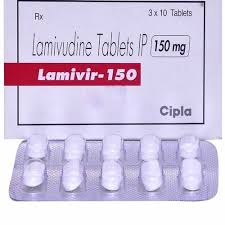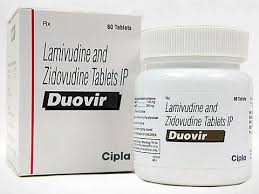Lamivir contains lamivudine, an antiretroviral medication used to treat HIV-1 infection. Lamivudine belongs to the class of drugs known as nucleoside reverse transcriptase inhibitors (NRTIs). It is used in combination with other antiretroviral agents to control HIV infection and improve immune function.
Composition:
Each Lamivir tablet contains:
- Lamivudine: 150 mg
Uses:
Lamivir is used for:
- The treatment of HIV-1 infection in combination with other antiretroviral medications.
- It helps reduce the viral load in the blood (amount of HIV) and increases CD4 (T) cell counts, thereby enhancing immune function and slowing the progression of the disease.
- Treatment of chronic hepatitis B virus (HBV) infection in adults and children aged 2 years and above.
Mechanism of Action:
- Lamivudine: Inhibits the reverse transcriptase enzyme, which is crucial for the transcription of viral RNA into DNA. By blocking this enzyme, lamivudine prevents the replication of HIV within host cells, thereby reducing the viral load in the bloodstream.
Dosage:
For HIV-1 infection:
- Adults and Adolescents (weighing at least 30 kg): The recommended dose is 150 mg twice daily or 300 mg once daily in combination with other antiretroviral agents.
- Children: The dosage for pediatric patients is typically based on body weight, adjusted by a healthcare provider.
For chronic HBV infection:
- Adults: The recommended dose is 100 mg once daily.
- Children: The dosage for pediatric patients aged 2 years and above typically depends on body weight.
Side Effects:
Common side effects:
- Headache
- Nausea
- Diarrhea
- Fatigue
- Nasal symptoms (runny nose)
- Cough
Less common but serious side effects:
- Lactic acidosis (buildup of lactic acid in the blood)
- Hepatomegaly with steatosis (enlarged liver with fat deposition)
- Pancreatitis (inflammation of the pancreas)
- Neutropenia and anemia (low white blood cell and red blood cell counts)
Recommendations:
- Take Lamivir exactly as prescribed by your healthcare provider.
- Do not adjust your dose or stop taking the medication without consulting your healthcare provider.
- Lamivudine can be taken with or without food.
- Inform your healthcare provider about all other medications and supplements you are taking to avoid potential drug interactions.
Important Note:
- Monitoring: Regular blood tests are important to monitor liver function, kidney function, blood cell counts, and to detect any potential side effects early.
- Lactic Acidosis and Severe Hepatomegaly with Steatosis: Be aware of symptoms such as unusual tiredness or weakness, abdominal pain, shortness of breath, and nausea. If these occur, seek medical attention promptly.
- Hepatitis B Exacerbation: In patients with chronic hepatitis B virus infection, discontinuation of lamivudine may result in severe acute exacerbations of hepatitis B. Monitor liver function closely for several months after stopping treatment.
- Pregnant women or those planning to become pregnant should inform their healthcare provider to discuss potential risks and benefits.
- Store the medication at room temperature, away from moisture and direct light.
- Keep all medical appointments and undertake regular follow-up visits to monitor your overall health and the efficacy of the treatment.
- Report any new symptoms or side effects to your healthcare provider immediately.
This comprehensive overview covers the essential aspects of Lamivir (Lamivudine 150 mg Tablets). For any specific concerns or questions, always consult your healthcare provider.




Reviews
There are no reviews yet.